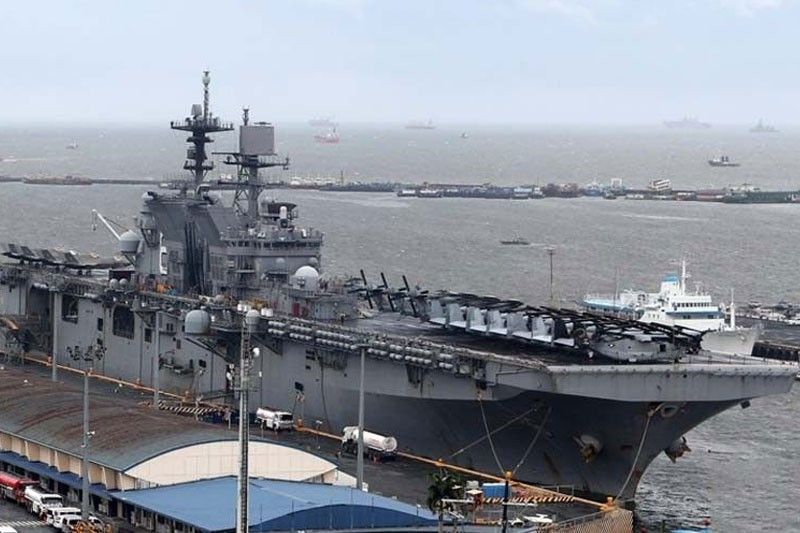
Manila, Philippines — The United States Navy will maintain its presence in the Indo-Pacific Region amid China’s “destabilizing” actions in the South China Sea (SCS) and the West Philippine Sea (WPS).
This was according to Capt. Claudine Caluori, Mission Commander of the US Navy’s Pacific Partnership 2023, when asked by reporters at a virtual briefing if the US would be doing more to help the Philippine Coast Guard and the Philippine Navy deal with Chinese harassment in the West Philippine Sea.
“While I cannot comment directly on US response, again I will say that the US will continue to fly, sail and operate safely and responsibility wherever international law allows,” she said.
“These actions (by the Chinese) are destabilizing and threaten the region’s security and prosperity and this is why our primary focus is on strengthening the terms and collaboration with our growing network of allies and partners,” she said.
The Pacific Partnership Mission is the largest annual multinational humanitarian assistance and disaster relief preparedness mission conducted in the Indo-Pacific. It included stops in the Philippines, Vietnam, Malaysia, Fiji, Samoa, Palau, Papua New Guinea and Tonga.
“I just want to reiterate that our government has reaffirmed that a strong US-Philippine alliance is vital to a free and open Indo-Pacific Region and that we’ll continue to partner closely with the Philippines,” she stressed.
Caluori noted that for more than 70 years, the US Navy “has maintained a persistent maritime presence in the Indo-Pacific and the US Navy and the US Indo-Pacific Command is committed to continuing its forward presence, which is focused on stability and regional cooperation and economic prosperity for all nations.”
“The US will continue to fly, sail and operate safely and responsibly where international law allows and the US Indo-Pacific Command will remain dedicated to a free and open Indo-Pacific Region and we expect all countries in the Indo-Pacific to operate in international waters safely and in accordance with international law,” she said.
Building relations
Caluori said Pacific Partnership is designed to bring several nations together to build relationships, enhance interoperability and elevate preparedness for responding to disaster emergencies in the region.
“So the focus is disaster relief preparation and as I’ve stated earlier, for more than 70 years the US Navy has maintained a persistent maritime presence in the Indo-Pacific and we remain committed to continuing this forward presence which is focused on stability, regional cooperation and economic prosperity for all nations. And as always, a free and open Indo-Pacific is vital to the interest of the United States and its allies and partners,” she said.
“Our allies and partners are one of our greatest strengths and key strategic advantage. We are advancing the shared vision alongside our allies and partners of a free and open and secure Indo-Pacific and we continue to deepen our connections with regional allies and partners and we will continue to support our allies and partners as they strengthen those relationships with each other,” she said.
“We are committed, we remain committed to upholding a free and open Indo-Pacific Region where all nations large and small are secure in their sovereignty, can pursue economic opportunity and resolve disputes without coercion. And, of course, have freedom to navigate and fly consistent with international laws and norms,” she added.
Asked if the US Navy may consider joining resupply missions to BRP Sierra Madre in Ayungin Shoal, Caluori said: “Our government has reaffirmed that we have a strong US-Philippine alliance which is vital to the free and open Indo-Pacific Region, that we’ll continue to partner closely with the Philippines.”
“Our relations are based on strong cultural and historical linkages and a shared commitment to democracy and human rights. These strong people-to-people ties and economic cooperation provide additional avenues to engage on bilateral regional global issues,” she pointed out.
“Our alliance continues to contribute to the security of our two nations while also strengthening the rules-based order that benefit all nations within the Indo-Pacific.”
‘Phl infiltrated’
In Zamboanga City, Armed Forces chief Gen. Romeo Brawner Jr. directed the military to be on alert as many areas in the country “have been infiltrated.”
Brawner led a joint change of command ceremony at the Western Mindanao Command (Westmincom) headquarters.
“When we talk about territorial defense, we are not just looking outward but we should look inwards. Let us watch out because we might have been, or let me say this, we have already been infiltrated. We have already been infiltrated in all areas of our country, including Zamboanga and the areas under Western Mindanao Command,” Brawner said in a speech.
He told the newly installed Westmincom commander Lt. Gen. William Gonzales to coordinate with the National Intelligence Coordinating Agency (NICA) in dealing with the reported “infiltration.” Brawner declined to provide details. — Nillicent Bautista, Roel Pareño

Leave A Comment